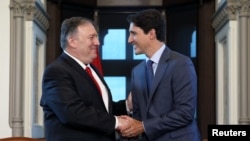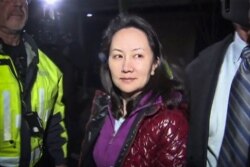Updated at 4:23 p.m. Aug. 22.
Secretary of State Mike Pompeo assured Canada on Thursday that the United States was working to get China to release two Canadians it detained last year on espionage charges in cases linked to a U.S. criminal charge against a Chinese technology executive.
On a visit to Ottawa, Pompeo told Canadian Prime Minister Justin Trudeau, "Please do know our team is focused on helping those two Canadians be released. We're working on it diligently. It's wrong that they are being held."
Pompeo said that "China needs to honor the commitments it's made to the world, and it's our expectation they'll do so."
Ahead of their talks, Trudeau said he appreciated U.S. efforts and would be talking with Pompeo about "how we move forward on that." Trudeau said last month that U.S. President Donald Trump had raised the issue with Chinese President Xi Jinping at one of their meetings.
China detained former Canadian diplomat Michael Kovrig and entrepreneur Michael Spavor in December 2018 in an apparent attempt to pressure Canada to release Meng Wanzhou, chief financial officer at Huawei, the giant Chinese telecommunications company.
Meng was arrested Dec. 1 in Vancouver at the request of U.S. authorities, who want her extradited to stand trial on fraud charges in the U.S. Since her arrest, she has been staying at her multimillion-dollar mansion there awaiting extradition proceedings.
'Arbitrary' detention
Pompeo, speaking to reporters, denied that the Chinese and Canadian arrests were comparable.
The "arbitrary" detention of the Canadians in China is " is fundamentally different as a human rights matter, as a rule-of-law matter," he said.
"These are fundamentally different matters than the Canadian decision to use their due process and the rule of law to behave in a way that's deeply consistent with the way these decent nations work," Pompeo said.
China, he said, wants to "talk about these two as if they're they're equivalent, as if they're morally similar, which they fundamentally are not."
Canadian Foreign Minister Chrystia Freeland, when asked whether Ottawa had asked the United States to drop its extradition demand, told reporters that applying the extradition treaty was "not a political decision."
"Extradition is a criminal justice matter. It is not a political matter, and the case of Ms. Meng is currently before the Canadian courts, as it ought to be. As for the U.S. case against Ms. Meng, I think that's a matter for the U.S. and the U.S. criminal justice authorities," she said.
China's relations with Canada have been icy since the arrest of Meng, who is the daughter of Huawei's founder, Ren Zhengfei.
After Trudeau spoke about the detention of the two Canadians Thursday, China's embassy in Ottawa condemned the continued house detention of Meng.
"China adheres to the principle of equality between all countries, no matter big or small. ... China-Canada relations now suffer gross difficulties, and the Canadian side knows very well the root cause," the embassy said. "Canada should release Ms. Meng Wanzhou immediately and ensure her safe return to China, and bring bilateral relations back onto the right track."
Some imports halted
Since the Meng arrest, China has stopped importing some Canadian products such as canola seed and meat. It also resentenced a convicted Canadian drug smuggler to death.
Kovrig and Spavor, the two detained Canadians, have been accused of conspiring to steal state secrets, but no evidence has been disclosed. They have not been allowed access to family members or lawyers while China has them in custody.
Meng is accused of lying to banks about the company's dealings with Iran in violation of U.S. trade sanctions.
Resolution of the cases has been complicated by the ongoing tit-for-tat tariff war between the U.S. and China and their lack of success, at least so far, in reaching a new trade agreement. The U.S., however, says the trade talks are separate from the criminal case against Meng.






